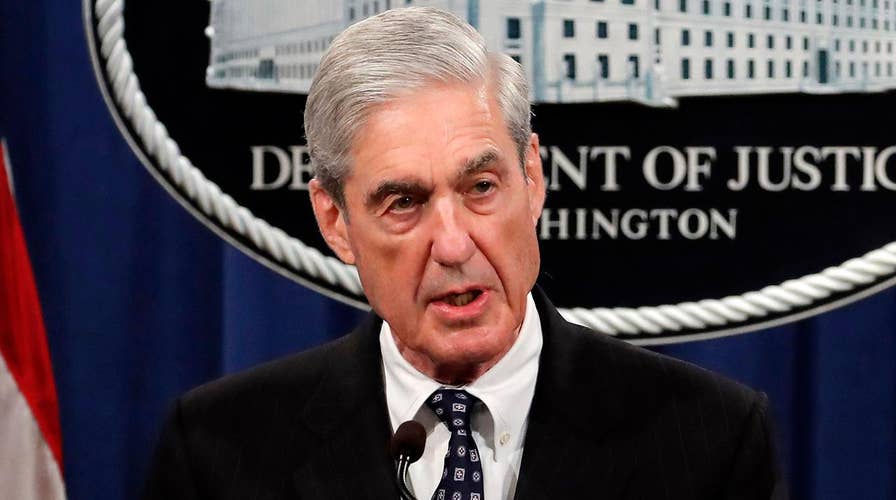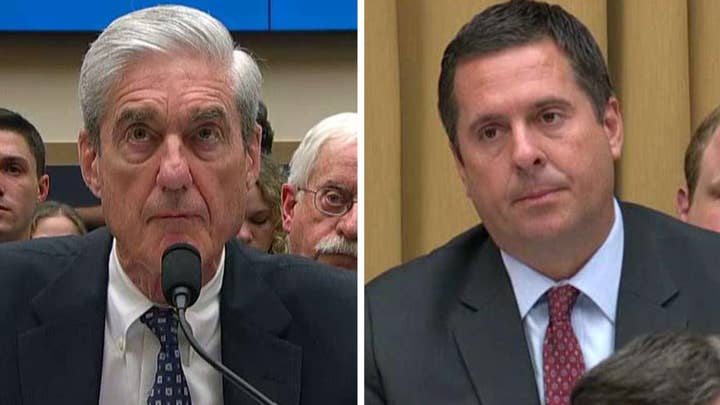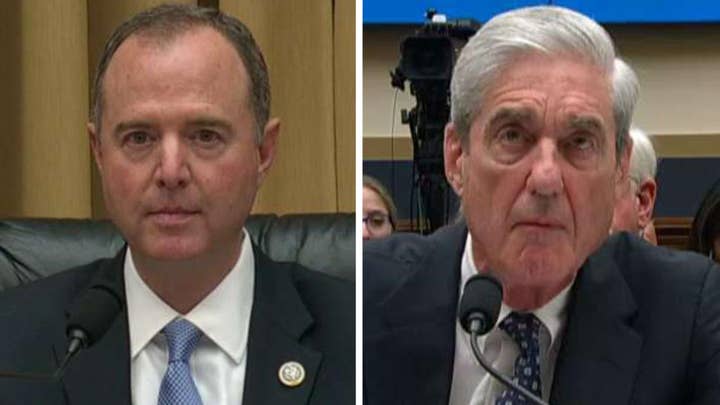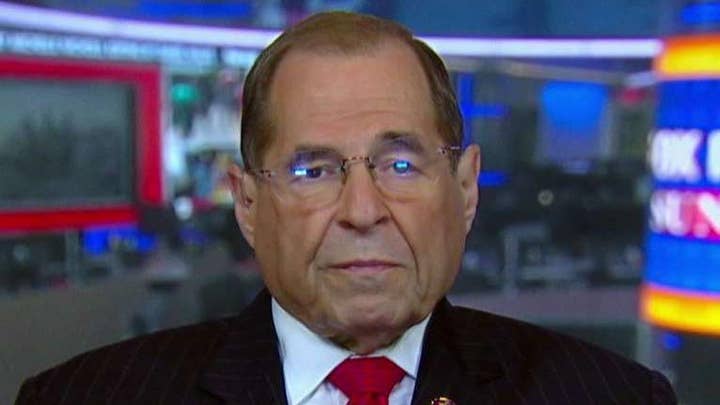Democrats pin impeachment hopes on Robert Mueller's testimony
Lawmakers go all-in on former special counsel Robert Mueller's scheduled appearance on Capitol Hill; reaction and analysis on 'The Five.'
Democrats hoping that hours of testimony by former Special Counsel Robert Mueller might fuel their case for President Trump’s impeachment were left with little new material at the conclusion of Wednesday's back-to-back hearings, as Republicans gloated that the spectacle failed to make the case to oust the president.
“It’s time for the curtain to close on the Russia hoax. The conspiracy theory is dead,” said Rep. Devin Nunes, R-Calif., top Republican on the intelligence committee.
REPUBLICANS CONFRONT MUELLER WITH ALLEGATIONS OF DOUBLE STANDARD IN RUSSIA PROBE
Mueller stood by his team's findings at Wednesday's hearings—reiterating that the special counsel’s office found no evidence of a criminal conspiracy between Trump associates and Russia, while also stating that the president was not exonerated on allegations of obstruction of justice despite his assertions to the contrary.
But in doing so, he also repeatedly refused to drift beyond the bounds of his report.
This was, to an extent, expected as Mueller had signaled he would only address material already in the public record. But the absence of any political bombshells, coupled with a hearing performance by Mueller that was at times halting and flustered, left unclear whether anti-Trump Democrats would be able to use any of it to further their calls for impeachment.
“This is all about their last best chance of convincing the American people that the president ought to be impeached,” Rep. Steve Chabot, R-Ohio, a member of the House Judiciary Committee, told Fox News. “They haven’t succeeded thus far and I think this is that effort.”
Nunes called it the "last gasp of the Russia collusion conspiracy theory."
Mueller declined to go down the road of the impeachment topic, under questioning from both Republicans and Democrats.
Rep. Veronica Escobar, D-Texas, of the Judiciary Committee, directly questioned Mueller on whether he was suggesting that Congress impeach Trump.
“You explained [in May] ... that the Constitution requires a process other than the criminal justice system to formally accuse a sitting president of wrongdoing,” Escobar said, quoting Mueller’s remarks during his press conference in May. “That process other than the criminal justice system to accuse a sitting president of wrongdoing—is that impeachment?”
“I’m not going to comment on that,” Mueller said, as she continued to press the issue, citing a footnote in the report.
“What are other constitutional processes?” she said.
Mueller replied: “I think I heard you mention at least one.”
“Impeachment, correct?” she pressed.
“I’m not going to comment,” he said
MUELLER ISSUES CLARIFICATION, TAKES BACK BOMBSHELL STATEMENT ABOUT INDICTING TRUMP
In May, Mueller’s statement was taken by many on the left as a green light to intensify talks about impeachment proceedings, and to ramp up existing Trump-focused investigations.
But on Wednesday, even as Republican Rep. Mike Johnson of Louisiana attempted to get an answer from Mueller on impeachment, the former special counsel wouldn’t bite.
Johnson said Democrats “desperately wanted you today to tell them they should impeach the president.”
“The report does not recommend impeachment, does it?” he asked.
Mueller maintained that he was “not going to talk about recommendations,” and when asked again, he stated clearly that he was “not going to talk about that issue.”
Rank-and-file Democrats have been calling for impeachment for months, as several House committees lead Trump-focused investigations into his alleged obstruction of justice, his financial history, and ties to foreign individuals.
“I think there is a broad consensus in our caucus,” Rep. David Cicilline, R.I., said Wednesday, suggesting that House Speaker Nancy Pelosi will get on board, despite being cool to the idea and helping turn back a recent impeachment resolution on the floor. “I think ultimately the majority of our caucus wants to move forward with an impeachment inquiry.”
Rep. Sheila Jackson-Lee, D-Texas, said that the Mueller hearing laid “the building blocks” for an impeachment inquiry.
But, despite rank-and-file hopes that Mueller's testimony would change the political calculus of Democratic leaders who have been reluctant to pursue impeachment, Pelosi signaled the hearings barely rose to her attention.
When asked if she had watched the hearing, Pelosi, D-Calif., said Wednesday, “Just a little bit,” adding that she only watched a few moments “because we’ve been so busy.”
Mueller started his day with testimony before the House Judiciary Committee and ended with a hearing before the House Intelligence Committee.
In between hearings, White House Press Secretary Stephanie Grisham tweeted: “The last three hours have been an epic embarrassment for the Democrats.”
Even fierce Trump critics voiced concern that the hearings were doing Democrats no favors. Harvard Law Professor Laurence Tribe called the hearing a "disaster" that "sucked the life" out of the Mueller report.
The president has, since its inception, decried the investigation as a “rigged witch hunt,” and maintained his innocence, repeatedly stating that Mueller found “no collusion” and “no obstruction.”
But Mueller, on Wednesday, maintained that the president “was not exculpated,” and when asked directly by Judiciary Committee Chairman Jerrold Nadler, D-N.Y., if his report totally exonerates the president, as Trump has argued, Mueller replied, “No.” He also rejected descriptions of the probe as a "witch hunt" or "hoax."
Meanwhile, Republicans on both panels peppered Mueller with questions about the origins of the Russia investigation, the role of the anti-Trump dossier authored by ex-British intelligence officer Christopher Steele, and alleged misconduct by the FBI during the bureau’s initial July 2016 investigation into Russian meddling and potential collusion with members of the Trump campaign. Mueller declined to entertain those questions.
Republicans also repeatedly confronted Mueller with lines of questioning meant to illustrate a double standard with regard to how his office pursued allegations against Trump and his associates and how they reviewed allegations of misconduct by others.
Mueller, though, repeatedly said he could not comment and continued to say the issues were outside of his “purview.”
Mueller was appointed on May 17, 2017 by former Deputy Attorney General Rod Rosenstein, who assumed oversight of the Russia investigation after former Attorney General Jeff Sessions recused himself from the probe due to his involvement with the Trump campaign during the 2016 election. Mueller’s investigation lasted nearly two years, ultimately finding no evidence of a criminal conspiracy and not reaching a conclusion on whether the president obstructed justice.
Fox News' Henry Erlandson and Alex Pappas contributed to this report.







